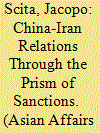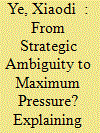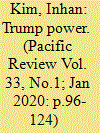| Srl | Item |
| 1 |
ID:
184394


|
|
|
|
|
| Summary/Abstract |
The article aims to understand how China has dealt with the puzzle of Iran's sanctions. Beijing's approach and reaction to the question of sanctioning Tehran and abiding by the sanctions imposed by the United States and the UNSC are a response to a complex matrix formed by three distinct but co-existing dimensions: the bilateral relationship with Iran, that with Washington, and its own positioning within the international community. Each dimension is associated with the performance of a specific international role. What emerges from the analysis of three case studies – the introduction of the 1996 Iran and Libya Sanction Act, the UNSC resolutions imposing sanctions on Iran (2006-10), and the response to Washington's Maximum Pressure campaign – is that, for China, Iran's sanctions are an inherent source of conflicts between its roles. Ultimately, Beijing's responses to the emerging conflicts between its roles have been cautious and aimed at tempering their possible escalations, even though the case studies show that a quite visible hierarchy of roles exists. China's role vis-à-vis Iran occupies a lower position than those performed vis-à-vis the United States and the international community.
|
|
|
|
|
|
|
|
|
|
|
|
|
|
|
|
| 2 |
ID:
188942


|
|
|
|
|
| Summary/Abstract |
How do changes in US Taiwan policy play out? What is the logic behind these changes? To address these questions, existing studies have formulated four schools of explanation, providing valuable theoretical insights. However, these studies have obvious problems with unidirectional dichotomy and thus fail to identify a causal mechanism explaining the long-term trajectory of US Taiwan policy. This article conducts a re-typology of US Taiwan policy to break the traditional strategic ambiguity–clarity dichotomy by establishing three key indicators and argues that the orientation of US China policy and Taiwan’s US policy are the two major factors triggering changes. By conceptualizing and operationalizing the two independent variables as engagement-oriented, coopetition-oriented, containment-oriented, and hedging/bandwagoning/binding, this article develops a systemic theoretical framework to demonstrate how the US Taiwan policy transits between strategic clarity, maximum pressure, partial strategic clarity, between partial strategic clarity and strategic ambiguity, strategic ambiguity, and controlling the pro-independent forces. This article conducts empirical studies by reviewing the transition of US Taiwan policy under different presidencies in post–Cold War era to demonstrate how the theoretical framework works in realpolitik.
|
|
|
|
|
|
|
|
|
|
|
|
|
|
|
|
| 3 |
ID:
163853


|
|
|
| 4 |
ID:
173955


|
|
|
|
|
| Summary/Abstract |
China has started choking off the flow of financial resources entering North Korea by blocking North Korea’s export of natural resources and other industrial products since early 2017. What has pushed Beijing to enforce sanctions strictly, in contrast with its loose administration of sanctions in the past? By employing principal-agent theory, this article shows that Beijing’s conformity to sanctions depends on China’s own need and the degree of pressure from Washington for sanctions enforcement. Until the end of the Obama administration, China did not act meaningfully for sanctions enforcement, as the pressure from Washington was weak and North Korea’s nuclear capabilities remained limited. Now, international contexts have dramatically changed. Beijing feels a need to discipline Pyongyang with sanctions as Pyongyang has become a de facto nuclear weapon state. The new Trump administration in Washington has also pushed Beijing to do more to rein in Pyongyang’s weapon programs.
|
|
|
|
|
|
|
|
|
|
|
|
|
|
|
|